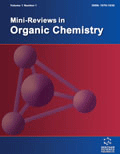To find the most relevant journal, please insert appropriate keyword to facilitate search.
Search Results: MROC

Mini-Reviews in Organic Chemistry
ISSN: 1875-6298 (Print)
eISSN: 1570-193X (Online)
The journal encourages submission of reviews on emerging fields of organic chemistry including:
• Bioorganic Chemistry
• Carbohydrate Chemistry
• Chemical Biology
• Chemical Process Research
• Computational Organic Chemistry
• Development of Synthetic Methodologies
• Green Synthesis and Microwave Synthesis
• Functional Organic Materials
• Heterocyclic Chemistry
• Hydrocarbons
• Macromolecular Chemistry
• Natural Products Isolation And Synthesis
• New Synthetic Methodology
• Organic Reactions
• Organocatalysis
• Organometallic Chemistry
• Theoretical Organic Chemistry
• Polymer Chemistry
• Stereochemistry
• Structural Investigations
• Supramolecular Chemistry
Special Issues With Active Call for Papers
Catalytic removal of toxic and harmful gases in complex environments
During a fire accident, carbon monoxide, carbon dioxide, sulfur dioxide, and other toxic and harmful gases are the main components of fire smoke but are also important factors causing fire casualties and damage to electronic equipment. Effective removal of carbon monoxide, carbon dioxide, sulfur dioxide, and other toxic and hazardous gases from fire smoke can minimize the harm of fire. Catalytic oxidation is currently recognized as an effective means of removing carbon monoxide, carbon dioxide,... see more
Small Molecules, Big Impact: Pioneering Approaches in Anti-inflammatory Care
This thematic issue is dedicated to the latest advancements and research breakthroughs in the realm of anti-inflammatory pharmacotherapy. With inflammation playing a critical role in numerous chronic conditions such as cardiovascular diseases, diabetes, and autoimmune disorders, there is an urgent need for more targeted, effective, and safer anti-inflammatory treatments. This issue seeks to showcase cutting-edge research on small molecule compounds that offer new hope in the fight against inflammation. We invite contributions that cover a... see more
Applications of Molecular Descriptors in Physicochemical Properties Research of Organic Compounds
Chemical graph theory is concerned with all aspects of the application of graph theory to various areas of chemistry, including organic, theoretical, mathematical, and computational chemistry, as well as in bioinformatics and computational biology. By the use of the term chemical it is emphasized that one is allowed in chemical graph theory, unlike in graph theory, to rely on the intuitive understanding of many concepts and theorems rather than on formal mathematical proofs. Converting atoms... see more
Flexible Electronic Materials and Devices: Design and Applications
Flexible electronics have undergone significant advancements in the past decade, enabling their application across a wide range of domains where conventional rigid electronics are not suitable. These include areas such as bioelectronics, electronic sensors, wearable technology, flexible displays, and medical devices. The innovations in flexible electronics are particularly critical in fields where properties like flexibility, stretchability, and lightweight construction are essential for both functionality and comfort. Two primary strategies have been developed to introduce flexibility... see more
Ionic Liquids
Ionic liquids (ILs) are a class of materials that are considered as functional materials. They are used in many technological applications that include as organic solvents, organic catalysts, separation science in analytical chemistry, biopolymers processing, as lubricants, heat transfer fluids, and among others. Additionally, they are considered as electrolytes for battery for their nonflammable, fire-retardant properties, high thermal stability, and high electrochemical windows as opposed to organic electrolytes that are highly flammable. They are in... see more
Active Alkaloids: Structure, Mechanism of Action, Chemical Synthesis, and Biosynthesis
The scope of this topic encompasses the structure, mechanism of action, chemical synthesis, and biosynthesis of active alkaloids. Alkaloids, a class of nitrogen-containing organic compounds with alkaline properties, originate from a diverse array of sources. Many alkaloids exhibit significant biological activities and serve as key constituents in numerous medicinal plants. They possess a wide range of pharmacological properties, including anti-tumor, antiviral, anti-inflammatory, and antimicrobial effects, making them valuable assets in both medical and agricultural domains.... see more
The role of organic synthesis methodologies in drug discovery
This special issue mainly discusses the significance of synthetic methodology in drug discovery, showcasing its vital role in drug design, synthesis, optimization, molecular library construction, and related fields. The focus areas include organic synthesis methods, biosynthetic methods, natural product structure optimization and molecular editing. Furthermore, it addresses the chemical reactions of drug molecules in organisms, molecular mechanisms in the treatment of major diseases, and related topics. We welcome submissions of in-depth or brief review articles... see more
Advancements in Synthesis of Bioactive Compounds
This thematic issue focuses on elucidating advanced synthetic strategies for bioactive compounds, with the primary objective of deepening understanding of the rational design and construction of target molecules. The exploration encompasses a diverse range of techniques, established name reactions, and cutting-edge synthetic methodologies. Specifically, the issue delves into the synthesis of both natural products and their analogs, highlighting innovative approaches and biological potential of these compounds. see more